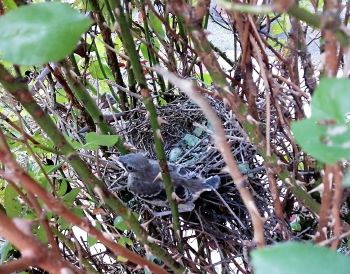UMES honors students in Dr. Amy Hagenrater-Gooding’s freshman English course are writing essays inspired by a year-long, university-wide reading initiative using Ross Gay’s Book of Delights and focusing on delights of their own.

I walked outside one day this past summer to a sky that was baby blue painted with wispy clouds. There was a breeze weaving through the air and then I felt something tap my head. I turned around to see a mockingbird flying around me.
A few days later, strolling to the park, I spotted a head poking out through the bush. I got closer to take a better look, and it was one of four baby mockingbirds, all still blind with no feathers. The mockingbirds had claimed my front yard as their new home and territory. From that day on, I made it my duty to watch these baby mockingbirds grow.
I tried to keep my family inside so the bird family wouldn’t feel anxious, yet the mockingbirds always attacked us when we walked past the nest. The thrill of running away from (real-life) angry birds was a delight. We didn’t want them to move away; we enjoyed their company.
Soon the babies were growing and were able to move about a lot more. In the beginning, they were pink, and their eyes were shut, and they hardly moved at all. The little creatures were now wiggling and shifting to get comfy in the nest. The rainy season came, however, and thunder flashed everywhere, scaring the parents into hiding.
Since we didn’t see them much, we assumed the parents weren’t getting enough food. Through Google, one of my sisters found out that mockingbirds are fond of grapes. So, my sisters and I started squishing grapes and tossing them with grapes, a satisfying splat on the ground. The birds liked their privacy so we could not watch them eat the grapes, but when we came back to check on their buffet, the grapes were gone.
Three weeks passed, and the baby birds began to stand at the edge of the nest like they were going to jump, but eventually, they just sat back down. The birds were round and plump and tumbled over each other like there was not enough space for them all to live comfortably. The first chick was brave and reckless and jumped with no single fear. The second bird came out without us looking; we are not sure where she went. The third was very cautious; he jumped out while his parents were near and sat on the ground for a while before moving. The third bird must’ve been lost because it was walking up to my house before the mother flew in to direct the little one to a nearby tree where the others were.

The last bird took its sweet time after a few days and a lot of yapping and nagging from the mama bird, he finally hopped out only to be attacked by a robin. The baby ran in fear while the mother swooped down and had a pecking fight with the robin, then the baby ran into the neighbor’s bush across from my house and safely met up with his siblings.
A sudden lump formed in my throat. We had gotten so used to seeing the birds. They were family. It felt lonely and quiet without them. I missed when they would come around and chase us till we reached the end of the sidewalk. I cherished the time I spent watching these birds grow.
Even my parents couldn’t fake being happy about their absence, but some of the birds come back from time to time to sit on the roof and scream for no absolute reason. It was like they were reminding me they were back home.
The author, Oluwatosin Ogunmola of Upper Marlboro, Md., is a freshman majoring in biochemistry.

